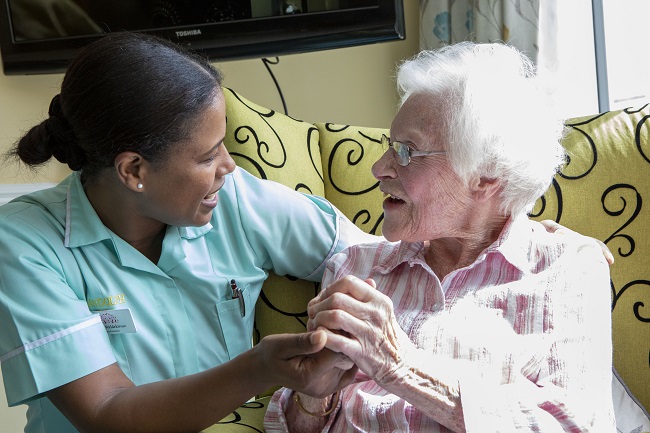Person-Centred Nursing Care
What is Person-Centred Care?
The Randolph Hill Nursing Homes Group believes passionately in treating each person as an individual, because we believe that getting older doesn’t make us any less unique.
We have a holistic approach to caring for older people; we look after the whole person and their emotional and social needs, as well as their care needs. We believe in celebrating life to the full and focusing on what individuals can do, rather than what they can’t.
Our residents are at the centre of everything we do. This is our core philosophy, and the culture of our nursing homes.
Care Objectives
Randolph Hill Nursing Homes Group sets out its Care Objectives as follows. Residents can expect;
- To be treated as an individual and experience care that is person-centred.
- To have their dignity and privacy respected at all times.
- To be supported to preserve the maximum level of independence possible.
- To have their social, emotional and religious needs acknowledged.
- To participate in the planning, delivery and review of their care as fully as possible.
- To be cared for in a safe, relaxed and comfortable environment with choice of participation in a range of activities.
Purpose-Built Facilities
All our nursing homes have been purpose built; designed to offer quality of care for residents at all times.
In some of our homes, we are pioneering a ‘small group living’ approach – by introducing smaller lounges and dining rooms on each floor. In some ways, our homes are more in keeping with a hotel.
For those residents with intensive nursing needs, we are able to offer the most appropriate facilities, support and 24-hour medical attention to be found outside a hospital environment.
Making Our Home Your Home
Rooms can be personalised by the resident with their choice of wall colours and soft furnishings. To make bedrooms as comfortable and familiar as possible, we encourage residents to bring personal mementos and furniture, if space allows. As long as the layout gives us space to nurse in, we’ll do our best to make rooms as homely and familiar as possible.
Friends and families are welcome to visit any time.
Individualised Care Plans
Shortly after arrival, we sit down with the resident, their key worker and often a close relative, to work out a detailed personalised care plan. This sets out clearly what level of care a resident needs, but also, as importantly, it is about exploring their likes and dislikes.
Perhaps it’s as simple as preferring to be called ‘Mrs McIver’ instead of ‘Isla’, or getting up at 8am rather than 7.30am. This kind of detail helps us get everything just right, and makes the transition to living in a nursing home that much easier.
The care plan is tailored to the resident and covers all aspects of their care, including:
- personal routines
- current medication
- interests and hobbies
- how staff can help on a day-to-day basis with personal care
- favourite things to eat and drink (and any allergies or special diets).
Life Stories
It’s not just the day-to-day things we like to find out about. Our person-centred approach also means we like to gather information about our resident’s background and past; their achievements and the big milestones in their life.
A vital resource for us is the life story that we complete with our residents. This is hugely important information, especially for a person with dementia and we note down their likes and dislikes, interests, family background and history.
It’s something we all enjoy, and is a very effective way of connecting with our residents.
We take the time to talk to a new resident, and their family, to learn about all the key events in their life, important moments and achievements. The life story enables us to strike up a conversation or trigger a reminiscence which can be invaluable in making the resident feel included and valued.
On a more practical level we also like to get a feel for how a resident likes to spend their time; so we can try to reflect that in their daily life with us. Maybe it’s an early morning cup of tea in bed with the newspaper; or we might discover that afternoon detective shows are their secret indulgence!
Our activity co-ordinators will try and accommodate a particular interest or talent. A love of singing may lead to the organising of an afternoon concert; a lifetime of breeding award-winning spaniels could result in regular visits from a dog and its owner. The more we get to know a person, the more we can make their lives active, fulfilling and still full of fun.
Jim’s Life Story
Jim’s story shows how we can aim to make our residents’ lives more fulfilling – in Jim’s case, by allowing him to experience the thrill of match day. But when he arrived, his lifelong passion for football was buried, until we applied the vital spark…
When Jim was admitted he did not communicate or interact in any way. It was very difficult to find out about his individual likes and dislikes – his wife had cared for him through his diagnosis of dementia and continued, without support, until illness took her into hospital.
Jim was always happy to watch activities but never got involved. Until the day he attended a football quiz — and shocked everyone by shouting out the answers!
When the activities organiser discovered that Jim was a big Hearts fan, he organised a trip to Hampden Park’s Scottish Football Museum.
There, the stadium’s original turnstiles, as well as replica terracing and dressing rooms – complete with the evocative smell of liniment oil – stirred yet more long-lost memories.
Jim talked about this outing for a long time.
“He loves his football, he’s a different person when he speaks about his love of all things Hearts. He’s animated and in a happy mood. It lightens my day too.” Jim’s wife.

